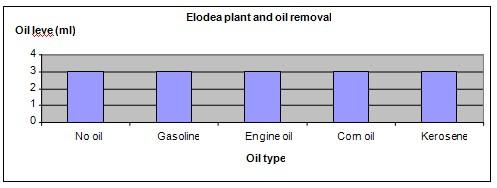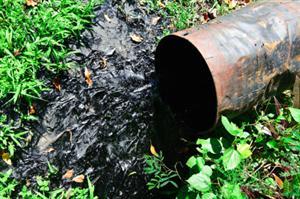| Complexity level: | 6 |
| Project cost ($): | 20 |
| Time required: | 1 hour to prepare, 7 days for observation |
| Material availability: | Easily found |
| Safety concerns: |
Hypothesis
The Elodea plant will be able to remove oil from water.
Overview
Oil spill effects
Oil is an organic substance with a lower density than water. When oil is poured or spilled on water, the two substances do not mix together. The oil will form an even and thin layer floating over the surface of the water. This thin layer of oil over the surface of the water is called "sheen". In natural water bodies like lakes or the ocean, oil spills can spread over a large surface area and unless they are removed quickly, they can cause the death of aquatic plants and animals.
Sheen on the water surface prevents light and air from reaching plants and animals in the water. This prevents aquatic plants from performing photosynthesis to produce food and oxygen. Without photosynthesis, plants will not be able to grow or germinate and they will eventually die if the condition persists. Oil spills also encourage the growth of algae, which also adversely affect the growth of aquatic plants.
Elodea
Elodea is an aquatic plant that is also known as waterweed. It is also often grown as an aquarium plant for decorative purposes, as it is attractive to look at. Elodea plants are a very important part of the ecosystem because they provide good habitats for small fish, amphibians and aquatic invertebrates. They are also a food source for some aquatic animals, such as turtles, ducks and beavers.
Scientific Terms
Materials
The materials required for this science fair project:
- 5 Elodea plants
- 5 measuring cylinders
- A bottle of gasoline
- A bottle of engine oil
- A bottle of corn oil
- A bottle of kerosene
- 1 liter of water
Tinker Crate — science & engineering build kits for ages 9–12 — real tools, real experiments, delivered monthly. (Affiliate link)
See what’s includedProcedure
1. For this science fair project, the independent variable is the type of oil covering the surface of the water i.e. gasoline, engine oil, corn oil or kerosene. The dependent variable is the reduction in the amount of oil in the measuring cylinder after 7 days. This is determined by measuring the level of oil remaining in the cylinder after 7 days. The constants (control variables) are the size of the Elodea plant, the size of the measurement cylinder, the amount of water and the amount of sunlight.
2. The 5 measuring cylinders are labeled as “none”, “gasoline”, “engine oil”, “corn oil” and “kerosene”. The 5 measuring cylinders are each filled with 200ml of water.
3. An Elodea plant is placed in each of the 5 measuring cylinders. The plant is completely submerged in the water. Then 5ml of gasoline, engine oil, corn oil and kerosene is added into the cylinders according to their markings. The cylinder marked “none” will not have any oil added.
4. The 5 measuring cylinders are left in a place where they are able to receive enough sunlight. After 7 days, the level of oil that was added to the surface of the water is observed to ascertain if the level of oil has reduced or remains the same. The observations are recorded in the table below.

Results
It is observed that the Elodea plants were not able to lower the level of oil in the measuring cylinders. After the 4th day, the leaves of the elodea plants started to yellow and the plants began to die.
| Oil type | No oil | Gasoline | Engine oil | Corn oil | Kerosene |
| Oil level (ml) | 3 | 3 | 3 | 3 | 3 |
The graph below represents the results of our experiment:

Conclusion
The hypothesis that the Elodea plant will be able to remove oil from the water, is proven to be incorrect.
Every year, millions of gallons of oil are discharged into the oceans due to accidents, careless handling and leaks. These incidents are causing very serious environmental problems that seriously threaten the survival of aquatic fishes and plants. When these oil spills wash to shore, they cause coastlines to become tarred and result in serious, permanent damage to the ecosystem. It is therefore crucial for us to discover ways of effectively cleaning up oil spills.
Also consider
The science fair project can also be repeated by using other plants like the Brassica Rapa to determine if the plant is effective in absorbing oil in water.
Try and repeat the experiment by using microorganisms or bacteria to remove oil from the water.
References
How does oil affect the growth of an aquatic plant? - http://www.ehow.com/about_6127348_oil-affect-growth-aquatic-plant_.html
The detrimental effects of oil spill on our environment - http://www.articlesbase.com/environment-articles/the-detrimental-effects-of-oil-spills-on-our-environment-1043176.html
Elodea - http://en.wikipedia.org/wiki/Elodea

